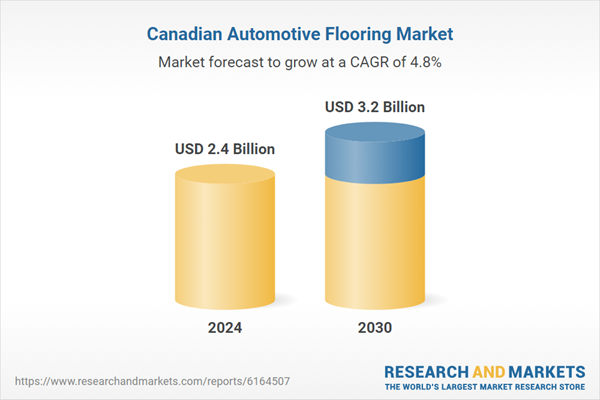Speak directly to the analyst to clarify any post sales queries you may have.
10% Free customizationThis report comes with 10% free customization, enabling you to add data that meets your specific business needs.
Sustainability and cost-efficiency are becoming primary concerns for vehicle manufacturers and suppliers. The shift towards electric vehicles (EVs) is fueling demand for specialized flooring materials that can accommodate battery placement and thermal insulation. Recyclable flooring products and those made from bio-based polymers are gaining traction, driven by tightening environmental regulations. In parallel, consumers are placing greater emphasis on ease of maintenance and comfort, creating opportunities for textile innovations and modular flooring systems that allow customization and flexibility.
Market Drivers
Growth in Electric Vehicle Manufacturing
Electric vehicle production is rising rapidly in Canada, creating specific demands for interior components including specialized flooring. EV platforms often require thermal insulation and lightweight materials to improve battery efficiency and driving range. Flooring materials that offer resistance to high voltage exposure and minimize vibrations are becoming essential. The market is witnessing innovation in materials that support EV-specific needs such as battery tunnel coverings and enhanced acoustic damping. As automakers expand EV production lines and governments incentivize electric mobility, the need for flooring systems tailored to EV interiors is growing. This trend is fostering R&D collaborations between flooring material developers and automotive OEMs, leading to new product launches that comply with evolving safety and sustainability standards.Key Market Challenges
Volatility in Raw Material Prices
The automotive flooring industry is heavily dependent on materials such as polymers, rubbers, and composites. Price fluctuations in petrochemical derivatives, caused by global supply chain disruptions or geopolitical tensions, directly impact manufacturing costs. These cost pressures are difficult to absorb or pass on to end consumers. As a result, manufacturers often struggle with price competitiveness and maintaining profit margins. Smaller firms in particular face sourcing challenges due to lack of procurement leverage, which may hinder their ability to scale or innovate. Price instability also affects long-term contracts, making it harder for OEMs and suppliers to plan effectively.Key Market Trends
Use of Bio-Based and Recycled Materials
There is a growing trend toward incorporating bio-based materials such as coconut husk, jute, and recycled PET bottles in automotive flooring. These options help reduce dependency on petroleum-based products and promote circular economy principles. Manufacturers are developing composites that retain durability and comfort while meeting environmental goals. The trend is aligned with global shifts toward eco-conscious manufacturing and reflects consumers’ willingness to pay a premium for sustainability-focused products.Key Market Players
- Magna International Inc.
- AutoFloor Canada Inc.
- Rymar Industries Ltd.
- TechnoFlex Group
- 3M Company
- Continental AG
- Autoneum Holding AG
- Toyota Boshoku Corporation
- Hayashi Telempu Corporation
- Suminoe Textile Co., Ltd.
Report Scope:
In this report, the Canada Automotive Flooring Market has been segmented into the following categories, in addition to the industry trends which have also been detailed below:Canada Automotive Flooring Market, By Light Type:
- Carpet
- Rubber
- Thermoplastics
- Others
Canada Automotive Flooring Market, By Vehicle Type:
- Passenger Cars
- Commercial Vehicles
Canada Automotive Flooring Market, By Sales Channel:
- OEM
- Aftermarket
Canada Automotive Flooring Market, By Region:
- Quebec
- Ontario
- Alberta
- British Columbia
- Saskatchewan and Manitoba
Competitive Landscape
Company Profiles: Detailed analysis of the major companies present in the Canada Automotive Flooring Market.Available Customizations:
With the given market data, the publisher offers customizations according to the company’s specific needs. The following customization options are available for the report.:Company Information
- Detailed analysis and profiling of additional market players (up to five).
Table of Contents
Companies Mentioned
- Magna International Inc.
- AutoFloor Canada Inc.
- Rymar Industries Ltd.
- TechnoFlex Group
- 3M Company
- Continental AG
- Autoneum Holding AG
- Toyota Boshoku Corporation
- Hayashi Telempu Corporation
- Suminoe Textile Co. Ltd.
Table Information
| Report Attribute | Details |
|---|---|
| No. of Pages | 85 |
| Published | August 2025 |
| Forecast Period | 2024 - 2030 |
| Estimated Market Value ( USD | $ 2.4 Billion |
| Forecasted Market Value ( USD | $ 3.2 Billion |
| Compound Annual Growth Rate | 4.8% |
| Regions Covered | Canada |
| No. of Companies Mentioned | 10 |









